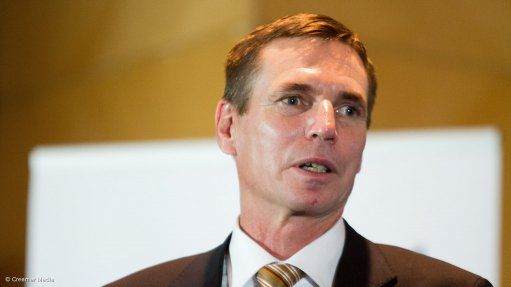
Imperial CEO Hubert Brody
Photo by: Duane Daws
The Imperial Group saw an 8% increase in operating profit to R6-billion for the year ended June 30, with revenue up 14% to R92.4-billion. One of the shining stars in yet another year of growth for the JSE-listed industrial services group, was its rest-of-Africa logistics business.
Speaking in Johannesburg, CEO Hubert Brody said the Africa logistics business, which included South Africa, saw operating profit increase by 1%, to R920-million. Revenue was up 9.5%, to R18-billion.
However, revenue in Africa, excluding South Africa, was up 23% to R4.6-billion, with operating profit up 45% to R224-million – this compared with R525-million revenue and R61-million operating profit in the 2010 financial year.
Trading conditions in the South African logistics market were challenging in the past financial year, noted Brody. The local logistics business was affected by the national transport workers strike, as well as a lack of momentum in the local manufacturing industry.
“We were well down in the first half due to the strike.”
Brody said the South African logistics business was being “streamlined”, to ensure it remained competitive on a cost front. This included merging business-unit lookalikes.
In contrast to the performance in the local market, the acquisitions and expansions made in the rest of Africa paid off handsomely for the group in the 2013 financial year, with the logistics business also finding general market conditions more favourable than in South Africa.
Key acquisitions over the last five years in the African market included CIC, which expanded Imperial’s distribution network; RTT Health Sciences, which provided pharmaceutical distribution and logistics in South Africa and the rest of Africa; and 49% of MDS Logistics, a large Nigerian logistics company.
Brody said Imperial had a “consumer logistics strategy” when it came to Africa.
Large fast-moving consumer goods (FMCG) companies and brand owners wanted to be in Africa with its rapidly growing middle class, but wanted more of the work done for them than what had traditionally been demanded from logistics companies, said Brody.
He said Imperial Logistics would do the “basics” for its customers in the African markets where it operated, as well as sell and market their products.
“We’ll take ownership of the product on their behalf. We’ll take it right to market.
“‘Get me there, sell my product, grow my brand’; that is the value proposition we offer and it is very attractive to our clients.”
Following the recent acquisitions, Imperial Logistics now owned facilities in more than ten countries, including Ghana, Nigeria, Botswana, Tanzania and Kenya.
“Africa holds good potential going forward. It is a distinctive vision of our logistics business,” noted Brody.
The Imperial Group would focus on further expanding its footprint in the logistics industry in Africa, which is expected to show stronger growth than the South African market, he added.
“The footprint is strong, but there is a lot more we can do. Many parts of the continent have a demand for advanced logistics services.”